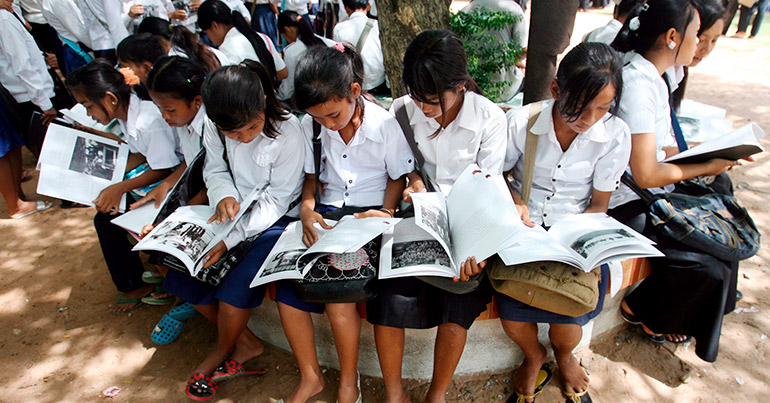Cambodia must shed its long-standing – and outdated – allegiance to rote learning in favour of alternative teaching strategies, the country’s education minister said today.
Referencing a 2016 World Economic Forum report that states 65% of children entering primary education today will end up performing job roles that do not yet exist, Hang Chuon Naron told an education forum in Phnom Penh that the government needed to develop a holistic approach to schooling.
He underlined the need to develop alternative teaching strategies, like “project-based learning”, that focus on developing “soft skills” such as “critical thinking” and creativity.
The comments came on the back of yesterday’s announcement that government funding for education will increase by more than 35% next year.
“Number one is increasing teacher salaries, number two is budgets for schools, number three is school restoration and construction, and number four teacher training, and number five improving school management,” Naron said when asked in a telephone interview how the additional funds would be distributed.
Chhem Rethy, executive director of the Cambodia Development Resource Institute, welcomed the increased investment in Cambodia’s education and highlighted the need for higher standards of teacher training.
“If you have a great teacher with good skills that promotes active learning from the students, the rest will come – kids are smart,” Rethy said.
“We should transform our teachers from [being] knowledge providers to learning coaches because the knowledge is not always in the mind of teachers anymore, it’s in your hand – in your phone”.
Many of the education forum’s panellists conveyed similar messages, with Errol Cresshull, team leader for Cambodia’s Third Education Sector Development Programme, telling the audience that “learning how to learn is more important than what you learn”.
The education forum, organised by the International Business Chamber of Cambodia, also addressed how the private sector could advance the state of Cambodia’s education system.
Cambodian businesses have been held back by a skills shortage, with the World Bank reporting in 2012 that 73% of employers found that university graduates did not have the right skills for the jobs available.
During his speech, Naron identified this as an area in which the government would benefit from enhanced private sector engagement, and encouraged businesses to help design the curriculum so that students would develop skills better suited to the demands of the labour market.
And, according to Romdoul Kim May, general manager of the Cambodian Federation of Employers and Business Associations, the government needs to give equal attention to both academic and vocational training if it is to be successful in addressing the problem.
“What’s needed today might not be needed tomorrow. But that’s the thing – the need for something to be put in place that helps anticipate what you’re going to need; having a structure in place where you can easily adapt to the market needs,” she said.
“In a way it’s easier for developing countries like Cambodia, because they can just look over to their neighbours and other developed countries and say ‘right, this is what’s going to happen, this is where the world’s heading, where the economy’s heading, where technology’s heading’ and just prepare.”


